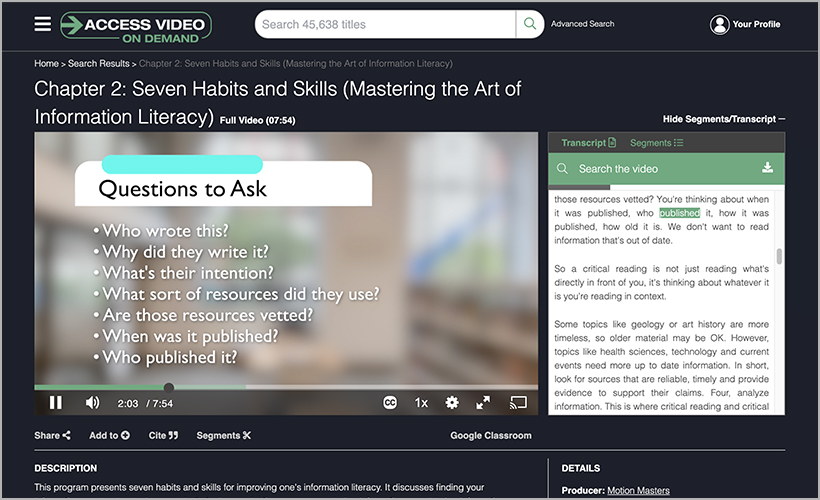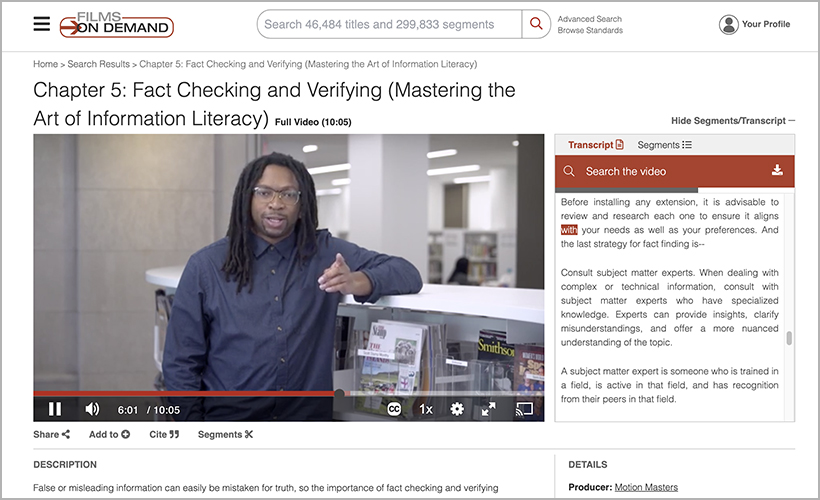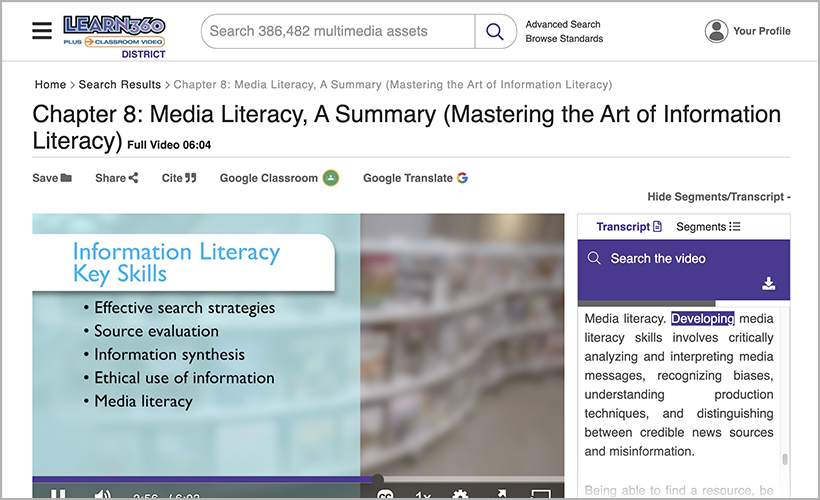In this era of widespread misinformation and disinformation, the importance of incorporating information literacy into education cannot be overstated. Students and patrons need to be equipped with research skills if they are going to be able to manage today’s information glut.
If you’re looking for a resource that can help teach how to evaluate and fact-check sources, avoid plagiarism, use sound search strategies, and more, we have an essential video series for you: Mastering the Art of Information Literacy (2023) from Motion Masters.
Available exclusively from Films On Demand for colleges and universities, Learn360 for K–12 schools and districts, and Access Video On Demand for public libraries, this eight-part series teaches students how to review information presented and become masters at evaluating information in books, online, in the news, and information generated by AI.
Mastering the Art of Information Literacy Episodes
Chapter 1: Introduction to Information Literacy (Item #291370)
What is information literacy and why is it important? This video introduces information literacy and its benefits, discussing the dangers of information illiteracy and the spread of misinformation. It cautions against information generated by AI.
Chapter 2: Seven Habits and Skills (Item #291371)

This program presents seven habits and skills for improving one’s information literacy. It discusses finding your information needs, developing search strategies, evaluating sources, analyzing information, considering information, using information ethically, and practicing.
Chapter 3: Evaluating Information Sources (Item #291372)
This program examines ways to know if a source is credible by looking at authorship and expertise, the publisher or platform, objectivity and bias, citations and references, and timeliness and currency of the information. It also presents tips for evaluating online sources by checking domain and URL, extensions, cross-referencing, and exercising caution with user-generated content.
Chapter 4: Effective Search Strategies (Item #291373)
Discussing how Boolean operators work, this program teaches search techniques for refining online searches. It also considers phrase, date range, file type, language, site-specific, numeric range, related terms, and advanced image searches.
Chapter 5: Fact Checking and Verifying (Item #291374)

False or misleading information can easily be mistaken for truth, so the importance of fact checking and verifying cannot be overstated. This program teaches practical strategies for verifying information. It discusses cross-referencing using multiple sources, investigating sources, checking primary sources, using fact-checking websites, assessing supporting evidence, and evaluating bias and objectivity. It also looks at how to identify fake or manipulated photos and videos.
Chapter 6: Ethical Use of Information (Item #291375)
Emphasizing the importance of using information in a way that is fair, honest, and shows respect for others, this program discusses aspects of copyright, plagiarism (including self-plagiarism), fair use, and privacy of information.
Chapter 7: Media Literacy (Item #291376)
How do you know if something is fake news? This program emphasizes the value of developing your critical thinking skills. It looks at source evaluation, media bias, political bias, ideological bias, corporate bias, sensationalism, and confirmation bias. It discusses how to use fact-checking sites, considers critical analysis of news media and deconstruction of messages, and looks at media manipulation.
Chapter 8: Media Literacy, a Summary (Item #291377)

This program emphasizes that information literacy is not just about knowing where to find information; it’s about knowing how to evaluate, analyze and use that information effectively, and responsibly. It reviews the importance of critical thinking and building one’s media literacy skills.
Take a FREE trial of Films On Demand, Access Video On Demand, or Learn360 today to watch this series!
What Is Films On Demand?
Films On Demand is a multidisciplinary, research-focused streaming video service providing unlimited access to thousands of videos, all carefully curated with a single guiding principle: provide every academic department on campus with the most essential video content for their field of study. At Films On Demand, we know that content matters. Our video library has been assembled not just with a focus on volume, but also with a discerning eye for quality and relevance. Plus, Films On Demand‘s platform provides users with the content, tools, speed, and performance that today’s online experience demands.
What Is Learn360?
The ultimate streaming multimedia resource for the K–12 educational market, Learn360 is an easy-to-use media library that is correlated to standards, organized for educators, and full of K–12 content from the industry’s top producers. Learn360 gives teachers, students, and parents access to more than 191,500 media resources—videos, interactives, printables, audio content, and more—on any Internet-enabled device, anytime, anywhere.
What Is Access Video On Demand?
Access Video On Demand streaming video offers public libraries an expansive, patron-friendly collection of thousands of high-quality videos that complement and enhance your library’s content offerings. We bring your patrons exceptional content from around the world that they may never have had the opportunity to see: from Oscar®, Emmy®, and Peabody Award-winning documentaries, to how-to programs that make life easier and richer, top-quality performances spanning the arts, biographies of history-makers past and present, a variety of TV shows and movies, and more.
See also:
- Information Literacy – Core uses innovative technology and proven pedagogy to build essential information literacy and critical-thinking skills that will help students thrive in their academic careers and beyond. Learn more here.
- Can ChatGPT Really Write Your Students’ English Essays?
- Have You Had “The Talk”? Discussing AI with Students
- Case Study: Video Streaming Service Meets Library Patrons’ Multiple Needs for Entertainment, Research, and More
- White Paper: Enhance In-Class Instruction with These 8 Benefits of Digital Resources
- White Paper: Implementing and Managing Streaming Media Services in Academic Libraries
- FREE White Paper: Debunking & Prebunking: Strategies for Librarians to Eradicate Misinformation
- Stay on Top of the 2024 Election with World News Digest



